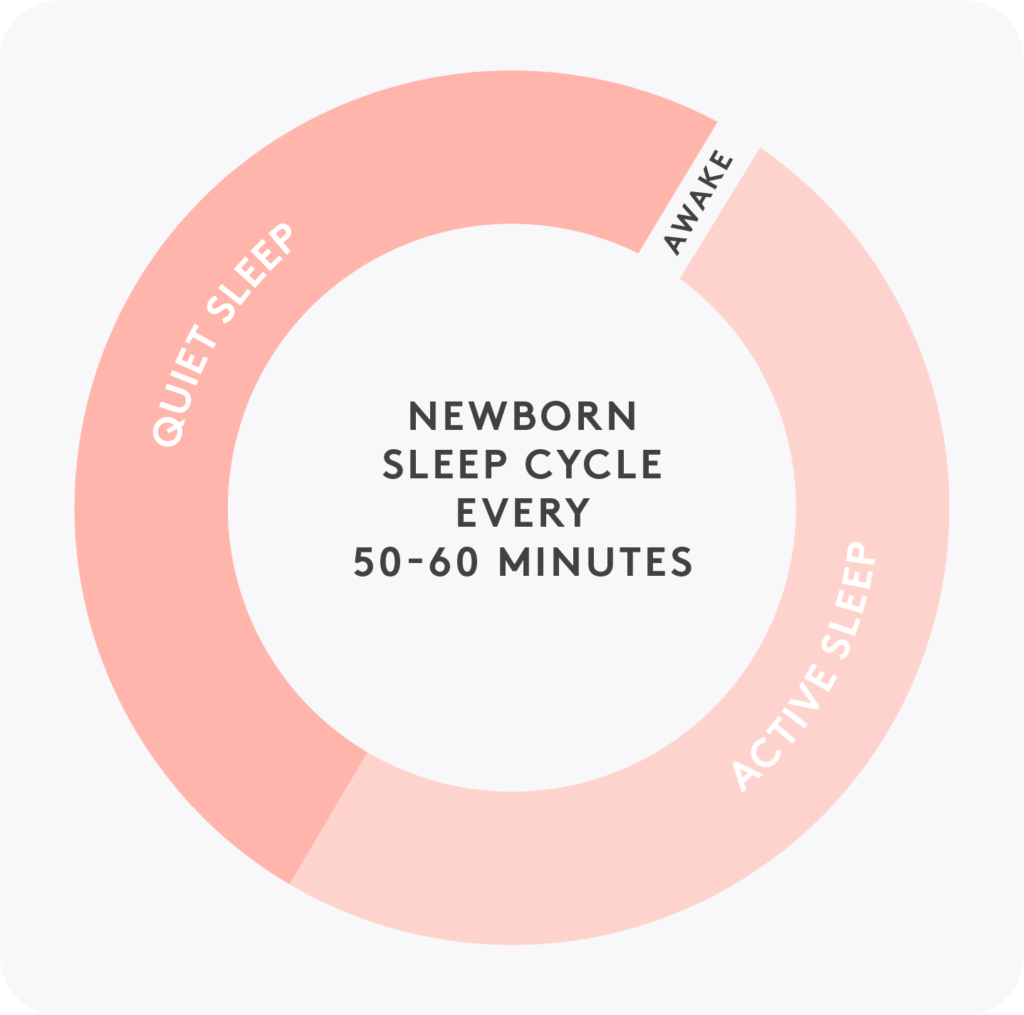
Becoming a parent is a journey filled with joy, love, and, let’s be honest, a fair share of challenges. While there is a wealth of information available to support expectant parents during pregnancy, there is often less emphasis on preparing for the realities that come after the baby arrives. One of the most daunting challenges new parents face is managing sleep deprivation and understanding newborn sleep patterns.
Sleep deprivation is expected, but understanding its duration and how to cope once it sets in is crucial. In this blog, we’ll discuss the normal sleep patterns of newborn babies, outline the trajectory of sleep in the first few months, and offer insights into managing the challenges that come with sleep deprivation.
It may seem like your newborn is sleeping all the time, and that’s because they are! Newborns need a lot of sleep, typically around 14-17 hours a day. This is because sleep plays a crucial role in their rapid physical and mental development.
Human infants are considered the most underdeveloped species at birth compared to other mammals. This is due to the size of the human brain at birth, which is relatively large compared to body size but still underdeveloped in terms of function, and the physical limitations of the human pelvis. This means that human infants are highly dependent on their caregivers for survival and development, much more so than other species. This underdevelopment at birth is one of the reasons why sleep is so crucial for newborns.
The early years of life are the most rapid time of growth and development. During this time, the brain forms new connections and pathways at an astonishing rate. Sleep plays a vital role in this process:
Understanding the sleep cycle of newborns is key to managing expectations and creating a conducive sleep environment.
Newborns are born with several body systems that are still maturing, including their circadian rhythms. This immaturity means that sleep is split somewhat evenly during the day and at night as opposed to being more consolidated at night. It can also cause day/night confusion, where a baby may sleep more during the day and be more awake at night. As their circadian rhythms mature and they are exposed to natural light during the day and darkness at night, this confusion usually resolves itself.
Additionally, the structure of sleep is different in newborns when compared to older babies and adults. For the first 3-4 months after birth, newborns primarily oscillate between two main phases of sleep—REM (Rapid Eye Movement) and non-REM sleep. Around 3-4 months old, a baby’s sleep begins to mature, and they start to enter sleep through stage 1, like adults. They also start to spend more time in the deeper stages of non-REM sleep.

In the first few weeks after birth, babies might sleep in short bursts, usually between 10-45 minutes, although they can sleep for longer stretches if they are sleeping on a caregiver. Your little one might sleep 3-4 hours at a time but will likely wake briefly between sleep cycles and may need help re-settling.
It is important not to let a newborn sleep for too long at a stretch as they need to eat frequently to regain their birth weight. If you are breastfeeding, you should encourage your baby to nurse every 2-3 hours during the day and every 3-4 hours during the night to build your milk supply.
Remember, every baby is unique, and the amount of sleep they need can vary. It’s always important to follow your baby’s cues and consult your pediatrician if you have any concerns.
The National Sleep Foundation states that newborns can sleep anywhere from 11-19 hours in a 24-hour period, which highlights the variability in sleep needs among newborns. Sleep is usually split equally throughout a 24-hour period, with a little one sleeping 7-8 hours during the day and around 8 hours of sleep at night, though not all in one go.
The newborn period is a very fluid time and is best approached with flexibility. Your baby might sleep a lot on one day only to be awake for more time the next. It is important to learn about your baby’s sleepy cues during this time and work on helping them settle to sleep after they have been awake for 60-90 minutes throughout the day.
While it is often advised to “sleep when the baby sleeps,” this is not always possible, especially if you have a busy toddler to chase after. However, it is important to take breaks throughout the day since you will be up during the night.
Babies in the first few weeks need lots of support while they are getting used to the outside world. They are growing and changing at a rapid rate. Eating and digesting milk is a big deal and takes lots of energy. It’s important to note that while pacifiers can be helpful in soothing a fussy baby, the American Academy of Pediatrics recommends waiting until breastfeeding is well established, usually around 3-4 weeks of age, before introducing a pacifier. Babies can become easily overstimulated and are helped by having a regulated caregiver who is attuned to their needs while they get used to all the stimulation of day-to-day life.
Once your baby is out of a swaddle and is able to take in more milk, and their circadian rhythm is more established, that’s when they usually start to sleep for longer stretches of time. Until then, it’s best to accept that sleep will be broken into smaller chunks. This doesn’t mean you can’t work on helping your child to sleep for longer stretches, but if you think your baby should be sleeping through the night and they aren’t, you may be more likely to be disappointed and frustrated.
Some babies figure out how to sleep for longer stretches of time early on, but most do not. Even if you have heard of a 6-week-old who sleeps through the night, most do not. It’s important to note that it is not recommended to start any sleep training until your baby’s sleep patterns have matured and they have developed the gross motor skills needed to self-soothe, such as repositioning their body and bringing their hands to their mouth intentionally. These skills are usually developed around the 6-month mark. While some pediatricians might suggest sleep training as early as 4 months, at Batelle, we recommend focusing on establishing good sleep habits and routines until your baby has reached 6 months old. This is because around the 6-month mark, many babies have achieved significant developmental milestones and are able to sleep for longer stretches. Our Batelle Babies program is not only designed to guide parents in creating a comforting, predictable sleep environment and responding to their baby’s needs during this crucial stage, but it also often translates to better sleep for the whole family in a way that is developmentally appropriate.
Besides understanding your baby’s sleep patterns and needs, it’s also crucial to create an environment that is conducive to sleep. This can significantly impact not only the duration of your baby’s sleep but also its quality. Here are some factors to consider:
The arrival of a newborn is a joyous occasion, but it also comes with a host of physical and emotional challenges. The sudden drop in hormones after birth, combined with sleep deprivation and the physical recovery from childbirth, can lead to feelings of sadness, anxiety, and overwhelm, commonly referred to as the ‘baby blues’. For some, these feelings may develop into postpartum depression, a more severe and long-lasting form of depression.
It’s important to recognize that these feelings are common and completely normal. It’s okay to feel overwhelmed, and it’s okay to seek help. Here are some strategies to support your emotional wellbeing during this time:
Be Kind to Yourself: Remember that you are doing the best you can in a challenging situation. Be kind and compassionate to yourself.
Talk About It: Share your feelings with someone you trust, whether it’s your partner, a friend, or a healthcare professional. Talking about how you’re feeling can provide a sense of relief and connection.
Seek Support: Don’t hesitate to ask for help, whether it’s with household chores, taking care of the baby, or just having someone to talk to.
Practice Self-Care: Make time for yourself, even if it’s just a few minutes each day. Read a book, take a walk, or enjoy a cup of tea. Taking care of yourself is essential for taking care of your baby.
Consult a Professional: If you’re feeling persistently sad, anxious, or overwhelmed, it’s important to seek help from a healthcare professional. They can provide guidance and support tailored to your specific situation.
Remember, taking care of your mental health is just as important as taking care of your physical health. It’s okay to seek help, and it’s okay to prioritize your own well-being. You’re doing an amazing job, and it’s okay to ask for support when you need it.
Navigating the challenges of newborn sleep, while also taking care of your own emotional wellbeing, is no small feat. It’s okay to have tough days, and it’s okay to seek support. You’re not alone in this journey, and there are resources available to help you navigate this phase with more ease and confidence.
